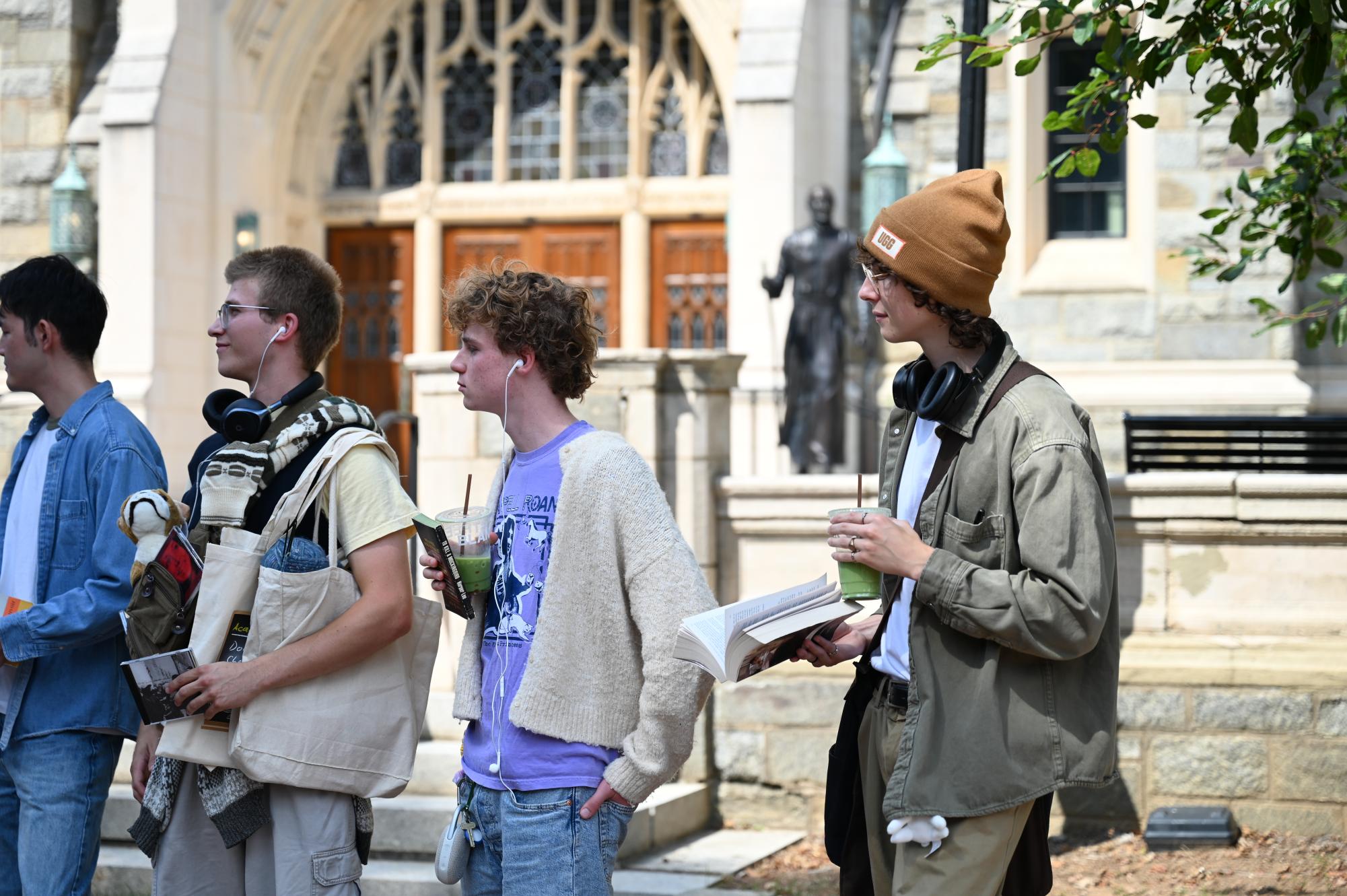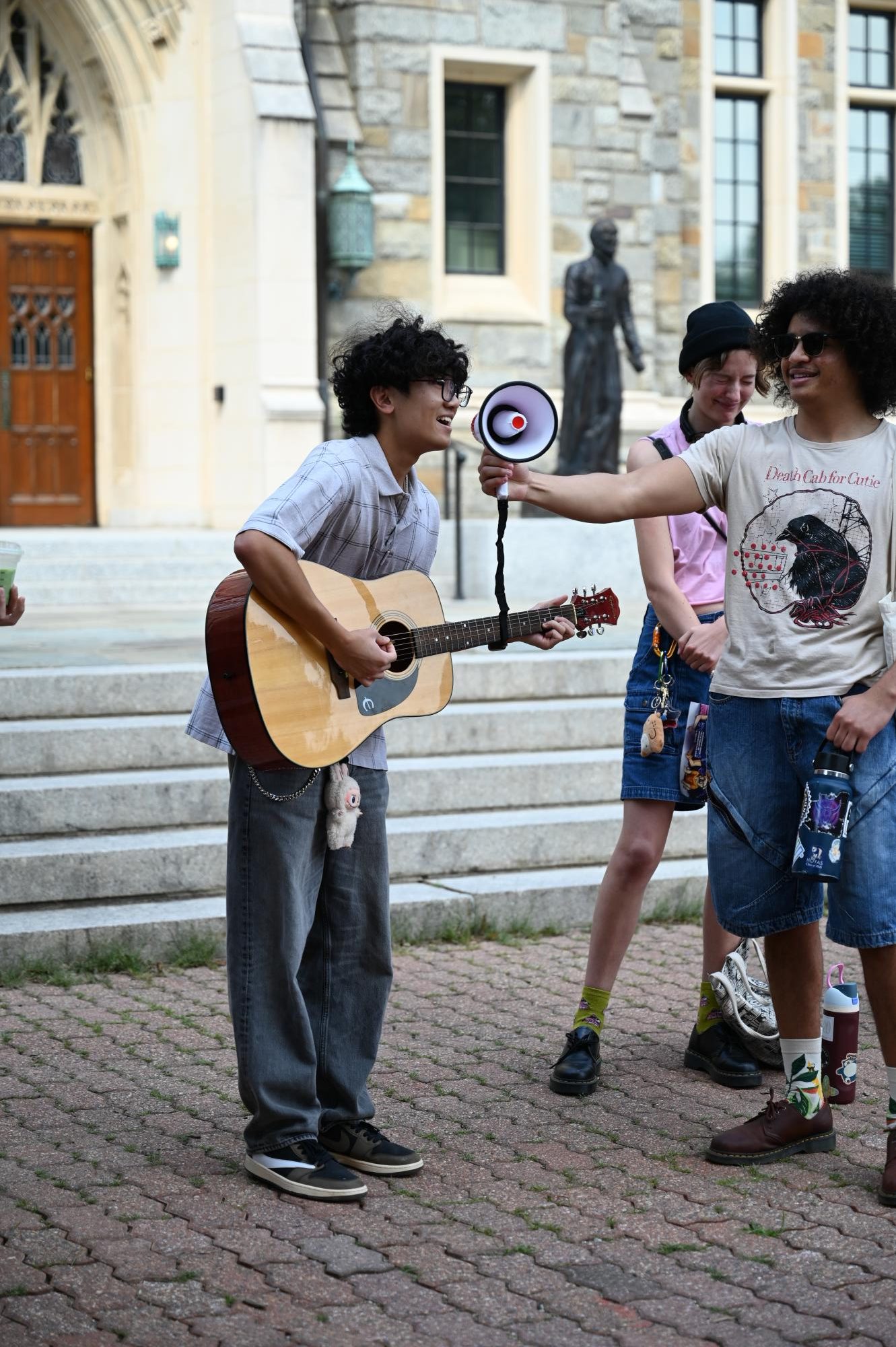Georgetown University students competed in a student-run “performative man” contest Sept. 14, embracing a viral, satirical trend that has sparked similar contests across the country.
After social media posts satirizing the “performative man” stereotype proliferated throughout 2025, the first performative male contest was organized July 20 in New York’s Washington Square Park, with competitions in other cities and college campuses cropping up throughout the following months. Men who take part in the pageantry show up as heightened caricatures of the stereotype of a man who expresses certain interests, fashion tastes and beliefs to win women’s romantic attention.

Nick Hasbun (CAS ’28) decided to host the contest at Georgetown after winning second place in the Washington, D.C. performative male contest Sept. 2. He said he organized the Georgetown contest to allow students to break away from what he feels is a prep-school culture on campus.
“Sometimes it’s definitely a more polished student body,” Hasbun told The Hoya. “But something like this is so fun because it’s like, ‘You know what? We can have fun and not have to wear suits and ties and be business students. We can screw around and have fun and embrace more indie and alternative cultural stereotypes.’”
At the Georgetown contest, the lines between performance and authenticity were blurred. Men who entered the contests said they realized their music and fashion tastes fit the stereotype, and showed up to poke fun at themselves and those who have adopted the same interests performatively.
The contest drew a crowd of over 150 on Copley Lawn, with 25 students competing for the coveted spot of most performative man. Exemplifying the ironic, unserious nature of the contest, two of the contestants were gay women.

Each contestant began by introducing themselves, giving a “fit” breakdown and displaying a cumulative eight guitars, three copies of “All About Love” by bell hooks and two vinyls of Clairo’s most recent studio album, “Charm.” Some contestants had more choreographed introductions, playing their guitars, blasting music from speakers clipped onto their belt loops or throwing tampons into the audience.
Hasbun then asked each contestant to name three women, and, giving the competition a Georgetown twist, asked which woman they would choose to be the first female president. After receiving a chorus of “Kamala Harris,” “my sister” and “Lana Del Rey,” among other responses, Hasbun brought out his mother, Sonia King, to ask the final question.
“How do you mend a woman’s broken heart?” King asked the contestants.
The crowd then selected the top three contestants by cheering for their favorite candidate, bringing Nolan Seebeck (CAS ’29) and Aadhav Rajesh (CAS ’27) to the position of finalists.
Seebeck said he and his friends crafted his outfit intentionally for the contest.
“This is a sweater that was thrifted by my close friend, who’s a woman,” Seebeck told The Hoya. “This is a Chappell Roan shirt that I purchased at a local record store. I have my tote bag from the Trident Bookstore — it’s a great spot, you should really check it out. I’ve got my carabiner with my speaker playing Radiohead, currently.”
Seebeck said his message to the Georgetown community is to keep embodying the values of the performative man.
“Keep being performative. Keep respecting women,” Seebeck said. “Understand that race is a social construct and that we need to break down those barriers.”
Radesh, the other runner-up, told the crowd about his ratings on Letterboxd, a movie-rating app, and flagged his singer-songwriter Instagram account. He said his friends helped him prepare for the contest.
“I cropped this shirt after I thrifted — don’t look at the hem too close to me; it’s coming out,” Radesh told the crowd. “My matcha. My white roommate bought this as reparations.”
Guitar slung over his shoulder, Rajesh said he didn’t consider himself to be faking any of these interests, but continued to lean into the joke.
“I think it’s really an authenticity of your spirit,” Rajesh told The Hoya. “When I’m not reading bell hooks or listening to Clairo, I’m really just trying to get into community and listen to women so I can learn how to better myself as a man.”
King, a professor of government at St. Petersburg College, said it is valuable for students to take a break from an all-consuming political environment through these contests.
“We all know that it’s a very divisive and polarizing environment in general right now, and it is critical to have these types of engagement activities for the student body to let off steam and just share in this comedy,” King said.
Cliff Stern (CAS ’26) contributed to reporting.